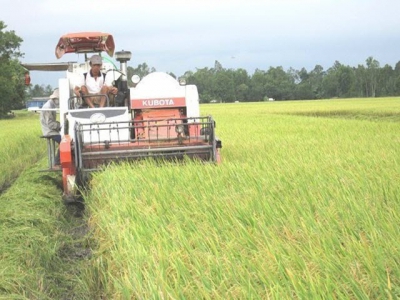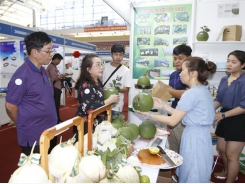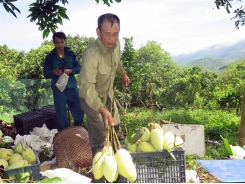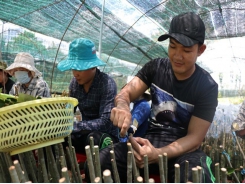Agricultural production poses environmental risk for Vietnam: expert

The growth of agricultural production in recent years comes at higher environmental costs, an expert told a conference in HCMC today, June 18.
A farmer harvests rice in the Mekong Delta region. The current agricultural production system has seen an increasing use of fertilizers and other agricultural chemicals
The conference was aimed at assessing the two-year execution of the Government’s Resolution 120 on sustainable and climate-resilient development in the Mekong Delta.
Pham Hoang Van, a representative of the World Bank in Vietnam, said that the country’s agricultural sector had improved its productivity and output as well as greatly contributed to national food security, poverty reduction and trade for the past 25 years.
With regard to the Mekong Delta, she highlighted improvements in intensive rice farming, aquaculture expansion and fruit production as well as the trade of these products.
Progress in productivity, output and agricultural exports is better than improvement in efficiency, farmers’ welfare and product quality, she said.
Vietnam has yet to catch up with other regional countries in terms of issues related to the productivity of agricultural labor and of water usage.
“The gap between agricultural and nonagricultural incomes is growing and income inequality is increasing in rural areas,” she said, pointing out that most of Vietnam’s agricultural products are sold in raw form and fall into the low- or medium-quality segment of the international market.
“Vietnam’s agricultural growth has so far been dependent on production expansion or further increases in the use of land and other natural resources as well multiple fertilizers and other agricultural chemicals,” Van explained.
Given these factors, she expressed concern that the growth of the sector would have a negative environmental impact, such as deforestation, destruction of aquatic resources, land degradation and water pollution. This growth, she said, is reliant on labor productivity, natural resources and chemicals.
As such, these production methods are unsustainable, so the agricultural sector in the Mekong Delta and across Vietnam needs to raise its value and reduce its input materials, according to Van.
In her view, this will bring considerable benefits to farmers, consumers and the ecosystem by using less land, water, labor, fertilizers, chemicals and energy, while reducing greenhouse gases, pollution and waste.
Also, this requires changes in land use and production and calls for the effective organization of value chains as well as ensuring the sales of products are aligned with market needs.
Professor Vo Tong Xuan, a well-known agronomist now serving as president of South Can Tho University, said at the event that the Government’s Resolution 120 on sustainable and climate-resilient development in the Mekong Delta, issued two years ago, does not force farmers to grow rice any more.
“Over the past 40 years, farmers have had to grow rice due to pressure to meet their assigned gross domestic product (GDP) targets,” Xuan said, adding that GDP was also calculated based upon the output of rice.
For a successful transformation, he said that the Ministry of Planning and Investment needs to speed up the execution of the resolution’s integrated regional master plan, and farmers need to produce good, sustainable materials. There are businesses that will purchase their commodities and process them into high-quality products, he added. SGT
Có thể bạn quan tâm
Phần mềm

Phối trộn thức ăn chăn nuôi

Pha dung dịch thủy canh

Định mức cho tôm ăn

Phối trộn phân bón NPK

Xác định tỷ lệ tôm sống

Chuyển đổi đơn vị phân bón

Xác định công suất sục khí

Chuyển đổi đơn vị tôm

Tính diện tích nhà kính

Tính thể tích ao hồ



 Vehicle path management: key to reducing compaction
Vehicle path management: key to reducing compaction  Mekong Delta to have quality breed sources for…
Mekong Delta to have quality breed sources for…